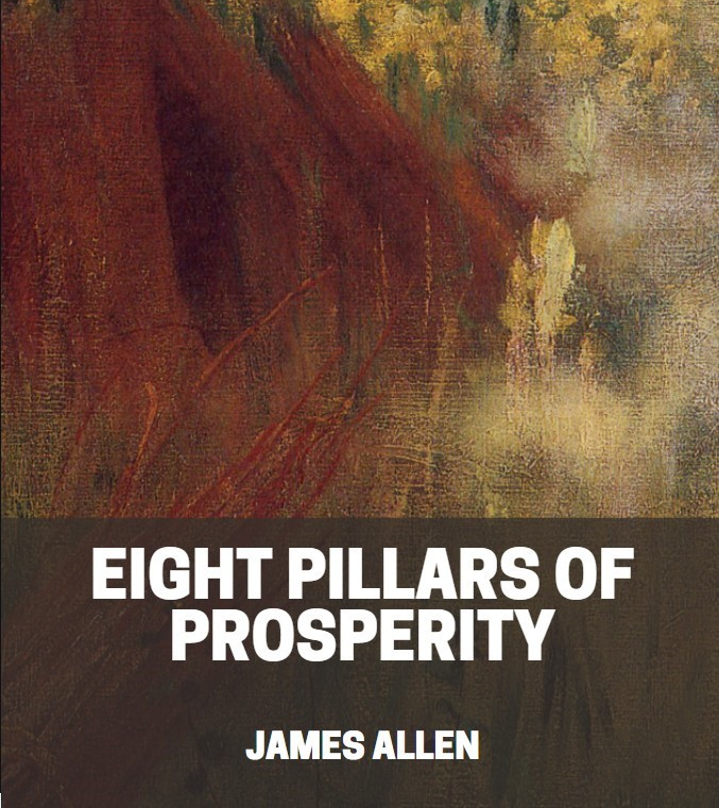
Prosperity rests upon a moral foundation. It is popularly supposed to rest upon an immoral foundation – that is, upon trickery, sharp practice, deception and greed. One commonly hears even an otherwise intelligent man declare that “No man can be successful in business unless he is dishonest,” thus regarding business prosperity – a good thing – as the effect of dishonesty – a bad thing. Such a statement is superficial and thoughtless, and reveals a total lack of knowledge of moral causation, as well as a very limited grasp of the facts of life.
It is as though one should sow henbane and reap spinach, or erect a brick house on a quagmire – things impossible in the natural order of causation, and therefore not to be attempted. The spiritual or moral order of causation is not different in principle, but only in nature. The same law obtains in things unseen – in thoughts and deeds – as in things seen – in natural phenomena. Man sees the processes in natural objects, and acts in accordance with them, but not seeing the spiritual processes, he imagines that they do not obtain, and so he does not act in harmony with them.
Yet these spiritual processes are just as simple and just as sure as the natural processes. They are indeed the same natural modes manifesting in the world of mind. All the parables and a large number of the sayings of the Great Teachers are designed to illustrate this fact.
The natural world is the mental world made visible. The seen is the mirror of the unseen. The upper half of a circle is in no way different from the lower half, but its sphericity is reversed. The material and the mental are not two detached arcs in the universe, they are the two halves of a complete circle. The natural and the spiritual are not at eternal enmity, but in the true order of the universe are eternally at one. It is in the unnatural – in the abuse of function and faculty – where division arises, and where main is wrested back, with repeated sufferings, from the perfect circle from which he has tried to depart. Every process in matter is also a process in mind. Every natural law has its spiritual counterpart.
Take any natural object, and you will find its fundamental processes in the mental sphere if you rightly search. Consider, for instance, the germination of a seed and its growth into a plant with the final development of a flower, and back to seed again. This also is a mental process. Thoughts are seeds which, falling in the soil of the mind, germinate and develop until they reach the completed stage, blossoming into deeds good or bad, brilliant or stupid, according to their nature, and ending as seeds of thought to be again sown in other minds. A teacher is a sower of seed, a spiritual agriculturist, while he who teaches himself is the wise farmer of his own mental plot.
The growth of a thought is as the growth of a plant. The seed must be sown seasonably, and time is required for its full development into the plant of knowledge and the flower of wisdom.
While writing this, I pause, and turn to look through my study window, and there, a hundred yards away, is a tall tree in the top of which some enterprising rook from a rookery hard by, has, for the first time, built its nest. A strong, north-east wind is blowing, so that the top of the tree is swayed violently to and fro by the onset of the blast; yet there is no danger to that frail thing of sticks and hair, and the mother bird, sitting upon her eggs, has no fear of the storm. Why is this?
It is because the bird has instinctively built her nest in harmony with principles which ensure the maximum strength and security. First, a fork is chosen as the foundation for the nest, and not a space between two separate branches, so that, however great may be the swaying of the tree top, the position of the nest is not altered, nor its structure disturbed; then the nest is built on a circular plan so as to offer the greatest resistance to any external pressure, as well as to obtain more perfect compactness within, in accordance with its purpose; and so, however the tempest may rage, the birds rest in comfort and security.
This is a very simple and familiar object, and yet, in the strict obedience of its structure to mathematical law, it becomes, to the wise, a parable of enlightenment, teaching them that only by ordering one’s deeds in accordance with fixed principles is perfect surety, perfect security, and perfect peace obtained amid the uncertainty of events and the turbulent tempests of life.
Download “Eight pillars of Prosperity by James Allen” eight-pillars-of-prosperity-by-James-Allen.pdf – Downloaded 4541 times – 1.80 MB
0 responses on "Eight Pillars of Prosperity by James Allen"